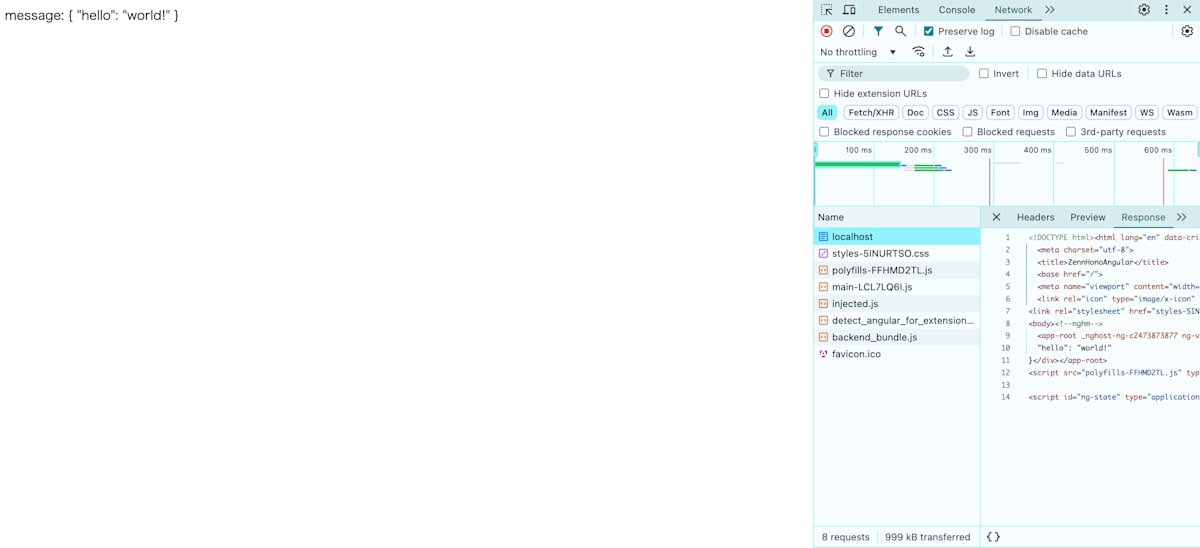Angular18 と Hono で SSR と RPC を試す
はじめに
HonoとAngularでSSRとRPC機能を試してみます。
Angularはv19でSSR/SSG周りの大きなアップデートを予定しているようですが、今回はv18で素振りをしておきましょう。
Angular を Hono で SSR
Angularはプロジェクト生成時にSSRを指定することでexpressベースのサーバーコードが生成されます。
$ ng new --ssr
生成されたサーバーコード
import { APP_BASE_HREF } from '@angular/common';
import { CommonEngine } from '@angular/ssr';
import express from 'express';
import { fileURLToPath } from 'node:url';
import { dirname, join, resolve } from 'node:path';
import bootstrap from './src/main.server';
// The Express app is exported so that it can be used by serverless Functions.
export function app(): express.Express {
const server = express();
const serverDistFolder = dirname(fileURLToPath(import.meta.url));
const browserDistFolder = resolve(serverDistFolder, '../browser');
const indexHtml = join(serverDistFolder, 'index.server.html');
const commonEngine = new CommonEngine();
server.set('view engine', 'html');
server.set('views', browserDistFolder);
// Example Express Rest API endpoints
// server.get('/api/**', (req, res) => { });
// Serve static files from /browser
server.get('**', express.static(browserDistFolder, {
maxAge: '1y',
index: 'index.html',
}));
// All regular routes use the Angular engine
server.get('**', (req, res, next) => {
const { protocol, originalUrl, baseUrl, headers } = req;
commonEngine
.render({
bootstrap,
documentFilePath: indexHtml,
url: `${protocol}://${headers.host}${originalUrl}`,
publicPath: browserDistFolder,
providers: [{ provide: APP_BASE_HREF, useValue: baseUrl }],
})
.then((html) => res.send(html))
.catch((err) => next(err));
});
return server;
}
function run(): void {
const port = process.env['PORT'] || 4000;
// Start up the Node server
const server = app();
server.listen(port, () => {
console.log(`Node Express server listening on http://localhost:${port}`);
});
}
run();
今回はこのexpressベースのサーバーコードをHonoベースに置き換えていきます。
Hono の設定
まずはHonoをインストールします。
$ npm i hono
$ npm i @hono/node-server
Angular v18ではデフォルトでprerender:trueとなってますが、今回はSSRを確かめたいのでprerender:falseとしておきます。
{
"projects": {
"[YOUR PROJECT]": {
"architect": {
"build": {
"options": {
"prerender": false,
},
},
},
},
},
}
server.tsにSSR含むサーバーコードを書きます。
SSRの動作確認用に /hello という雑なjsonを返すAPIも切っておきましょう。
import { Hono } from 'hono'
import { serve } from '@hono/node-server'
import { serveStatic } from '@hono/node-server/serve-static'
import { APP_BASE_HREF } from '@angular/common';
import { CommonEngine } from '@angular/ssr';
import { fileURLToPath } from 'node:url';
import { dirname, join, resolve } from 'node:path';
import bootstrap from './src/main.server';
export function app(): Hono {
const app = new Hono()
const serverDistFolder = dirname(fileURLToPath(import.meta.url));
const browserDistFolder = resolve(serverDistFolder, '../browser');
const indexHtml = join(serverDistFolder, 'index.server.html');
const commonEngine = new CommonEngine();
// json を返す hello API
app.get('/hello', (c) => c.json({
hello: 'world!',
}))
// SSRするパスを指定
app.get('/', (c) => {
const url = c.req.url;
return commonEngine
.render({
bootstrap,
documentFilePath: indexHtml,
url: `${url}`,
publicPath: browserDistFolder,
providers: [{ provide: APP_BASE_HREF, useValue: '' }],
})
.then((html) => c.html(html))
.catch((err) => {
console.error('Error:', err);
});
})
// 静的ファイルのパスを指定
app.use('/*', serveStatic({
root: './dist/zenn-hono-angular/browser',
index: 'index.html',
onNotFound: (path, c) => {
console.log(`${path} is not found, request to ${c.req.path}`)
},
}))
return app;
}
function run(): void {
const server = app();
serve({
fetch: server.fetch,
port: +process.env['PORT']! || 4000,
})
}
run();
Angular の設定
Angular側は簡単にOnInitでhello APIからデータをGETするコードとします。
import { Component, inject, OnInit } from '@angular/core';
import { JsonPipe } from '@angular/common';
import { HttpClient } from '@angular/common/http';
@Component({
selector: 'app-root',
standalone: true,
imports: [JsonPipe],
template: `
<div>message: {{ res | json }}</div>
`
})
export class AppComponent implements OnInit {
res: any;
#http = inject(HttpClient);
ngOnInit() {
this.#http.get<any>('http://localhost:4000/hello').subscribe((data) => {
this.res = data;
});
}
}
ビルドと実行
Angularは ng serveコマンドでもSSRできるようですが、ビルドと実行をそれぞれ実行します。
$ npm run build
$ npm run serve:ssr:<YOUR PROJECT>
Dev Consoleを開きながら http://localhost:4000/ にアクセスすると以下のようにSSR済のHTMLがレンダリングされてきます。

Angular を Hono で RPC
せっかくなのでHonoの至高な機能のRPCも試してみましょう。
HonoのRPC機能はざっくり言うとサーバ側とクライアント側でAPIの型を共有できる機能です。
まずはHonoから提供されているzodのラッパーをインストールします。
$ npm i @hono/zod-validator
サーバーサイドで以下のようなデータ型を定義し app.route('/', posts) としてルーティングに組み込みます。
最後にデータ型を任意の名前でexportします。
import { zValidator } from '@hono/zod-validator'
import { z } from 'zod'
...
const posts = new Hono()
.post(
'/posts',
zValidator(
'form',
z.object({
title: z.string(),
body: z.string(),
})
),
(c) => {
return c.json(
{
ok: true,
message: 'Created!',
},
201
)
}
)
export function app(): Hono {
...
app.route('/', posts)
...
}
export type PostsType = typeof posts
Angular側でその型をimportすることができ、エディタ上も補完が効きます。
これは便利ですね。
import { PostsType } from '../../server'
import { hc } from 'hono/client'
...
async ngOnInit() {
const client = hc<PostsType>('http://localhost:4000')
const res = await client.posts.$post({
form: {
title: 'Hello',
body: 'Hono is a cool project',
},
})
if (res.ok) {
const data = await res.json()
console.log(data.message)
}
}
一点注意として、上記コードではサーバサイドとクライアントサイドで2回 /posts へのリクエストが走ってしまします。
先ほどのAngularから提供される import { HttpClient } from '@angular/common/http'; では内部的に2度リクエストが発火しない仕組みが入っていますが、import { hc } from 'hono/client' にはないので、TransferStateなどを使って状態管理するなどの工夫が必要そうです。
まとめ
HonoとAngularでSSRとRPC機能を試してみました。
コードはこちら
Discussion